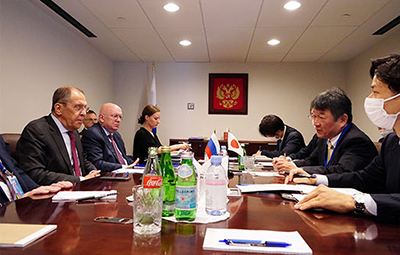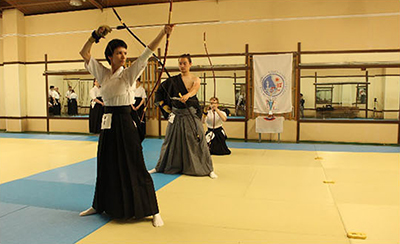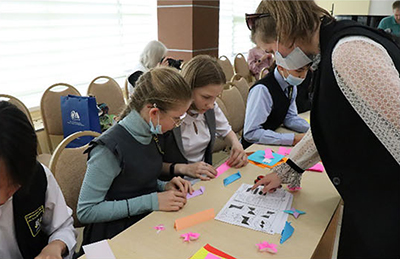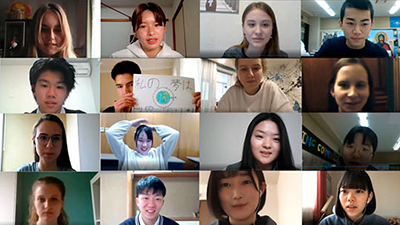Diplomatic Bluebook 2022
Chapter 2
Japan's Foreign Policy by Region
Section 6 Russia, Central Asia and Caucasus
1 Russia
(1) Situation in Russia
A Russia's aggression against Ukraine
In February 2022, Russia recognized the “Donetsk People's Republic” and the “Luhansk People's Republic,” which are the territory of Ukraine, as “independent states” and began the aggression against Ukraine under the pretext of protecting these regions. In response, the international community, including Japan, strongly condemned and imposed sanctions against Russia. Under the Putin administration, Russia has made a series of moves to undermine the territorial integrity of its neighboring countries in order to regain the sphere of influence it lost after the Cold War, causing serious concern in regions near Russia. Russia's aggression against Ukraine is an outrageous act that caused damage to another country which resulted in a serious humanitarian crisis claiming the lives of many civilians, and that shakes the very foundation of the international order that humanity has built up over the past century such as the prohibition of the use of force, the rule of law, and respect for human rights, not only in Europe but also in Asia.
The following is a review of the events before Russia's aggression against Ukraine in February 2022.
B Internal Situation in Russia
In the September 19 elections for the Russian State Duma (lower house), the ruling party “United Russia” retained more than two thirds of the seats on its own, despite a slight reduction in the number of seats compared to before the election, which allows them to amend the constitution. The organizations related to the Russian opposition figure Alexey Navalny was declared “extremist,” and those associated with the group were stripped of their eligibility for elections.
C Russian Economy
The Russian economy recovered rapidly in the second quarter (April-June), returning to pre-COVID-19 levels (GDP growth in the first half (January-June) was +4.8% year on year). This was due to factors such as the recovery of oil prices following the OPEC+ agreement on coordinated production cuts in December 2020, and the expansion of domestic demand, including investment, in a wide range of industries. However, inflation has been rising (+7.4% year on year as of September), and the Bank of Russia raised its key rate in stages. Since food prices also surged from the end of 2020, the Russian government introduced measures such as price ceilings on some items and export tariffs.
D Russian Diplomacy
In early February 2021, shortly after President Biden took office, the United States and Russia agreed to a five-year extension of the Treaty on Measures for the Further Reduction and Limitation of Strategic Offensive Arms (New START), which is the only remaining nuclear disarmament framework between the United States and Russia. Russia held its first face-to-face summit with President Biden in Geneva in June. While there have been attempts to explore cooperation in certain areas, these have not led to improved relations. The Russian military buildup in areas along the Ukrainian border since the fall became a new point of contention between the U.S. and Russia and was the main topic of discussion at the December U.S.-Russia summit held virtually.
Russia's relations with NATO also became more strained over the issue of closer Ukraine-NATO relations, and in October Russia decided to suspend the functions of its Permanent Mission to NATO in Brussels and the NATO Military Liaison Mission in Moscow.
Russia maintained close relations with China, although annual reciprocal visits between leaders did not take place following 2020 amid the COVID-19 pandemic. 2021 marked the 20th anniversary of the signing of the Treaty of Good-Neighborliness and Friendly Cooperation between the People's Republic of China and the Russian Federation, and the two countries agreed to an automatic five-year extension. There were concerning developments with respect to Japan's security. For example, in October, Chinese and Russian naval vessels sailed together around Japan for the first time, and in November, Chinese and Russian bombers flew together for the third time following July 2019 and December 2020. At the China-Russia summit held during the Beijing Winter Olympics in February 2022, China expressed support for Russia's proposal on security guarantees in Europe, which is noteworthy as a move that shows the strengthening ties between China and Russia in the context of European security.
In addition to its traditional cooperation with the Commonwealth of Independent States (CIS) countries, Russia continues to be actively involved in multilateral frameworks such as the Shanghai Cooperation Organization (SCO) and BRICS (Brazil, Russia, India, China and South Africa).
(2) Japan-Russia Relations
A Japan-Russia Relations in the Review of the Post-Cold War Order
Russia's aggression against Ukraine in February 2022 constitutes a challenge to the fundamental principle of the international community that unilateral change of the status quo by force is unacceptable, and threatens the post-Cold War world order. Japan, in solidarity with the G7 and the international community, strongly urged Russia to immediately withdraw its troops and comply with international law. In response to this situation, Japan, in close coordination with the international community, including the G7, is working to improve the situation by imposing sanctions against Russia in three areas: (1) asset freeze of Russian related individuals and entities, including President Putin; (2) sanctions in the financial sector, including restrictions on transactions with the Russian central bank and freezing the assets of seven Russian banks that are excluded from SWIFT1, and (3) an export ban to Russia of dual-use goods such as semiconductors, as well as of luxury goods.
The greatest concern between Japan and Russia is the Northern Territories issue. It is yet to be resolved even after more than 75 years have passed since the end of World War Ⅱ and the Government of Japan has firmly worked on the negotiations under the policy of concluding a peace treaty through the resolution of this issue. There is no change to Japan's position on the Northern Territories issue and its intention to meet the wishes of the elderly former residents of the islands. However, under the current circumstances of Russia's aggression against Ukraine, now is not a moment in which Japan can talk about the prospects for the peace treaty negotiations. Above all, Japan strongly urges Russia to take seriously the condemnation of the international community, withdraw its troops immediately and comply with international law.
The following is a review of the events before Russia's aggression against Ukraine in February 2022.
- 1 Overview of SWIFT (Society for Worldwide Interbank Financial Telecommunication):
・An association (cooperative) that serves as an intermediary and executor of financial transactions between banks around the world. Headquartered in Belgium.
・More than 11,000 banks and other financial institutions in more than 200 countries are connected to it, sending an average of more than 42 million messages related to international financial transactions per day.
・The association was established under Belgian law and is subject to the EU regulatory framework.
B The Northern Territories and Negotiations on a Peace Treaty
The greatest concern between Japan and Russia is the Northern Territories issue. The Northern Territories are islands over which Japan has sovereignty. The islands are an inherent territory of Japan but currently illegally occupied by Russia. Holding frequent dialogues between the two leaders and foreign ministers, the Government of Japan energetically worked on negotiations with Russia on its basic policy to conclude a peace treaty through the resolution of the issue of the attribution of the Four Northern Islands2.
In July 2021, Prime Minister Mikhail Mishustin “visited” Etorofu island, and in September, President Putin announced at the Eastern Economic Forum the introduction of a “preferential regime” in the “Kuril” Islands. In October, deputy prime ministers Grigorenko and Khusnullin “visited” the islands including Etorofu. These move by the Russian side are incompatible with Japan's position on the Four Northern Islands, and the Government of Japan lodged protests or made demarche at various levels.
Under these circumstances, Japan held a summit telephone call, a face-to-face foreign ministers' meeting, and two foreign ministers' telephone calls with Russia in 2021 amid the continuing impact of the COVID-19 pandemic. The September meeting between Foreign Minister Motegi and Foreign Minister Sergei Lavrov during the UN General Assembly in New York was the first face-to-face meeting between the two in over a year and a half.
In October, immediately after the inauguration of the Kishida administration, the two leaders held a Japan-Russia summit telephone call. In November, the first Japan-Russia Foreign Minister's Telephone Talk took place after Foreign Minister Hayashi took office.
Regarding the joint economic activities on the Four Northern Islands on which the leaders agreed3 to commence discussions during President Putin's visit to Japan at the end of 2016, Japan and Russia continued discussions in order to materialize the five candidate projects4 designated at the Japan-Russia Summit Meeting in September 2017.
The Government of Japan actively worked on projects contributing to the improvement of the atmosphere for the resolution of the Northern Territories issue, such as the four-island exchange program, free visits and visits to graves. In 2019, as part of humanitarian measures for the former island residents of the Northern Territories, a temporary additional entry/exit point was established on the occasion of a grave visit by ship, and furthermore, a grave visit by airplane was realized for a third year in a row. During the grave visits, the former island residents were able to visit places they had been unable to go to in recent years. However, due to the circumstances surrounding the COVID-19 pandemic the programs were canceled in 2021 as in 2020.
In addition, the Government of Japan is approaching and coordinating with the Russian side in order to ensure safe operations of Japanese fishing vessels around the Four Northern Islands and to continue the fishing of salmon and trout using alternative fishing methods to driftnet fishing prohibited by Russia. At the same time, Japan lodged protests against Russia over Russia's moves to build up military forces in the Four Northern Islands, on the grounds that such moves are contradictory to the Government of Japan's position regarding the territorial issue.
 Japan-Russia Foreign Ministers' Meeting
Japan-Russia Foreign Ministers' Meeting(September 23, New York, U.S.)
- 2 Refer to the Ministry of Foreign Affairs website for the position of the Government of Japan on the Northern Territories issue:https://www.mofa.go.jp/mofaj/area/hoppo/hoppo.html

- 3 As a result of the Japan-Russia Summit Meeting in December 2016, the two leaders expressed their sincere determination to resolve the peace treaty issue, agreed to commence discussions on joint economic activities on the Four Northern Islands, and agreed to improve procedures for grave visits by former island residents.
- 4 (1) Propagation and aquaculture of marine products, (2) Greenhouse cultivation, (3) Development of tours compatible with the islands' features, (4) Wind power generation, (5) Garbage disposal
C Japan-Russia Economic Relations
Trade volume between Japan and Russia in 2021 recovered from the decline caused by COVID-19 in 2020, and the trade volume from January to December increased 35.7% year on year. (The total trade volume in the statistics for January-December 2021 is approximately 2.4055 trillion Japanese yen (Source: Trade Statistics of Japan, Ministry of Finance)). The volume of direct investment from Japan to Russia increased from 239.5 billion Japanese yen (2019) to 247.6 billion Japanese yen (2020) (Source: Balance of Payments Statistics, Bank of Japan).
There have been some developments with regard to the Eight-point Cooperation Plan for Innovative Reform in the Fields of Industry and Economy and a Favorable Living Environment of Russia proposed by Prime Minister Abe in 2016, including the conclusion of a basic agreement on Japanese companies' participation in an LNG transshipment terminal project.
In November, Japan and Russia held the 13th meeting of the Trade and Investment Subcommittee of the Japan-Russia Intergovernmental Committee on Trade and Economic Issues and the 10th Meeting of the Subcommittee on Region-to-Region Cooperation online, which are vice-ministerial level talks. In February 2022, the Meeting of the Co-chairs of the Japan-Russia Intergovernmental Committee on Trade and Economic Issues, was held online between Foreign Minister Hayashi and Minister of Economic Development Reshetnikov.
Furthermore, the Japan Centers operating in six cities in Russia carried out business matching between companies from both countries and held management courses and training in Japan for Russian businesspersons. The training programs in Japan could not be conducted in 2021 due to the COVID-19 pandemic, but management courses were held online by Japanese instructors in which approximately, 6,800 people participated.
D Initiatives between Japan and Russia in various fields
(A) Security, Defense Exchanges and Maritime Security
As part of efforts to address “non-traditional threats” such as drugs, in September, a training course for counter-narcotics officers (Domodedovo Project), which has been ongoing since 2012 between Japan, Russia, and the UN Office on Drugs and Crime (UNODC), was conducted for counter-narcotic officers from Central Asian countries.
With regard to defense exchanges, Japan and Russia conducted the Japan-Russia Foreign and Defense Ministerial Consultation (“2+2” Ministerial Meeting), various dialogues between defense authorities, an annual meeting based on the Japan-Russia Incidents at Sea Agreement, the Japan-Russia Search and Rescue Exercise (SAREX) , and joint counter-piracy exercise in the Gulf of Aden from the perspective of building trust between Japan and Russia.
(B) Cultural and people-to- people Exchanges
It became difficult to hold many in-person events due to the spread of COVID-19, but exchanges in a broad range of fields took place mainly online, including the Japan-Russia Youth Exchange Program.
The “Japan-Russia Year of Regional and Sister-City Exchanges (Japan-Russia Regional Exchange Year)” was advanced mainly online. More than 400 Japan-Russia Regional Exchange Year programs have been accredited in Japan, with over 1.3 million participants that included the online introduction to the Japanese culture program “J-FEST” in which approximately 120,000 people participated.
 Japan-Russia Grassroots Exchange Program “Consul General's Cup Kyudo Tournament “White Night Style”” (June, St. Petersburg, Russia)
Japan-Russia Grassroots Exchange Program “Consul General's Cup Kyudo Tournament “White Night Style”” (June, St. Petersburg, Russia) Japan-Russia Grassroots Exchange Program “Tomari City Japanese Culture Festival” (October, Sakhalin Oblast, Russia)
Japan-Russia Grassroots Exchange Program “Tomari City Japanese Culture Festival” (October, Sakhalin Oblast, Russia) The Second Online Japanese Language Course High School Student Exchange, one of the Japan-Russia Youth Exchange Programs (March, Japan-Russia Youth Exchange Center)
The Second Online Japanese Language Course High School Student Exchange, one of the Japan-Russia Youth Exchange Programs (March, Japan-Russia Youth Exchange Center)